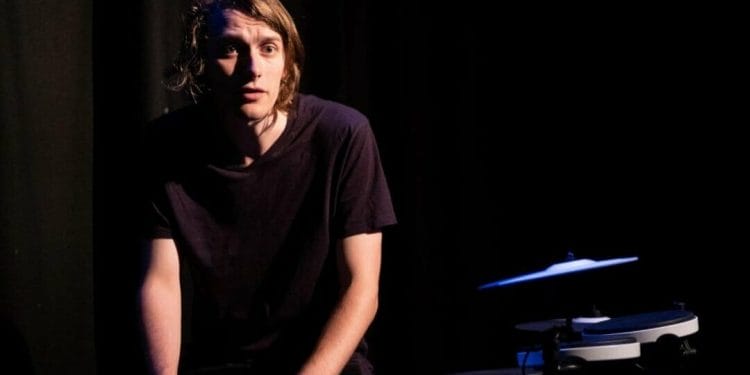Following in the footsteps of a successful Edinburgh Festival Fringe 2018 run, Antosh Wojcik’s mesmeric display of live drumming and spoken word returns for a UK tour.
As poems becomes beats, and beats become glitches in time, Antosh’s debut stage show tells the moving story of his Polish grandfather’s struggle against vascular dementia and the effect it had on the people around them. Using just his voice and a Roland TD-4KP electric drumkit, Antosh attempts to humanise memory loss through assigning rhythms to family members.
Full tour details can be found here.
You’re currently touring How To Keep Time, what can you tell us about it?
It’s a show about trying to connect to my Dziadek (Polish for ‘grandfather’) during his time with vascular dementia. It illustrates how the condition physically affected him through dislocating his speech and metaphysically how it changed his memory. It’s about playing drums for him for the first time and trying to be present with him, without foregrounding his dementia. I’m touring throughout the UK and it’s my first tour of a piece of work at this scale.
I’ve rewritten and remounted the piece with help from Penned In The Margins and dramaturgy from Yael Shavit, whose process has allowed me to access such deep territory in the work.
What inspired you to create this show?
My Dziadek’s dementia was a physical disconnection from us – he, I believe, was lucid and could process everything in front of him but the dementia had reworked how he could talk and connect to us. The writing of the show has been driven by the frustration I experienced in him, the frustration in myself of not being able to help him, the gradual loss a condition like dementia initiates. It’s also driven by a hope to connect or a defiance of the resolute way we can be about dementia. The show is me still telling him, ‘I’m here, I’m with you’ through all that happened.
Tell us more about how you integrate drums with your voice?

The drums are speaker, themselves, in the show. They have their own language, compete with my voice; sometimes we’re entwined and assist me in accessing memory or pinning down what’s going on with Dziadek; at other times they score memories and bring them to life. Sometimes, they are Dziadek and become his voice and body.
The drums are both the disruption of dementia and the key to connecting with Dziadek. They mirror a desperation in myself of not being able to connect to Dziadek in Polish (I can’t speak it) – as we lose our fluency in a shared language, I turn to another fluency, my drumming language, as a way of getting through to him.
How do you think this performance deepens audience understanding of Dementia?
Much of the performance embodies the disruption of dementia as it seeks to catch how the brain shifts, how memories rearrange, fall away, rework themselves, the frustration of losing control, the noise of it. At the same time, it attempts to empower a person with a severe diagnosis as someone who is still there, still able to control and laugh and live – there are times where I access Dziadek, below it all, and we play like we never did before.
Emotionally, I think the performance teaches what some of our responsibilities to those with a dementia diagnosis are; a need for presence, patience and acceptance, to not falter in our love and to not treat someone as gone or dying. It also doesn’t hide a human frustration with the condition and how hopeless it can be.
It was a big success at Edinburgh Fringe, did you expect such a positive response?

I was really taken with how much it spoke to people, how many people had experiences tangential to the show, that we could be united on a subject that has such individual impacts on a person. It felt good to know that making work about an elder could be accessible and that people wanted to see a piece on the subject of dementia, let alone take a risk on the conceit of the drums. It’s good to know I’ve made something that adds to the conversation of ageing, memory, of our elders – many pieces at Summerhall last year engaged with memory, so to be in a space of dialogue for the Fringe really helped.
What would you say to anyone thinking of coming to see How To Keep Time?
It’s a wild chase through the brain and memory, it’s surreal and daring and I hope it gives language to such a complex issue. It’s loud, it’s fun despite the inherent heaviness – the drumming really lifts the piece up. I get to see my Dziadek every time, so it’s full of love, hope and the need to talk to him again. It’s for anyone who would love to talk to someone they no longer can, again.














